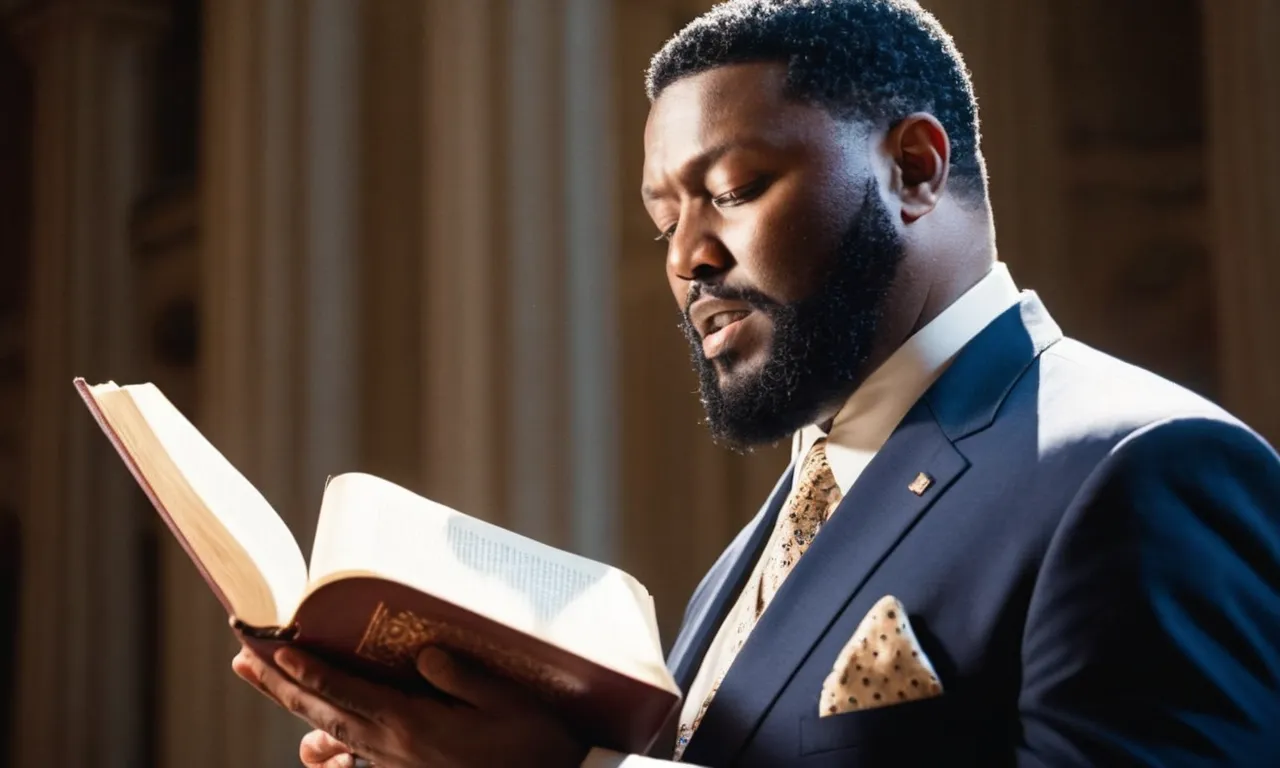Why Voddie Baucham Believes The Bible
The Bible has been a source of faith and guidance for billions of people over thousands of years. But why do people like pastor and author Voddie Baucham believe that the Bible is true? In this comprehensive article, we’ll explore Baucham’s reasoning and the evidence he finds compelling.
If you’re short on time, here’s the key reasons Voddie Baucham believes the Bible is true: Its historical accuracy, fulfilled prophecies, life-changing power, textual consistency, and personal experience.
We’ll dig deeper into each of those topics in the sections below, examining the scholarly evidence about the Bible’s origins, content, and impact that lead Baucham and many others to view it as the word of God.
The Bible’s Historical Accuracy
Archeological Evidence Confirming Biblical Events
Archaeological discoveries over the past two centuries have validated the historical accuracy of the Bible again and again. Here are some fascinating examples:
- The Merneptah Stele, dated to 1208 BC, contains the earliest reference to Israel outside of the Bible, confirming the timeline of the biblical Exodus.
- The Moabite Stone, erected around 840 BC by King Mesha of Moab, corroborates events like the Moabite uprising against Israelite rule mentioned in 2 Kings.
- Hezekiah’s Tunnel in Jerusalem was built around 700 BC to protect the city’s water supply, matching the account in 2 Kings and 2 Chronicles.
- The discovery of the Dead Sea Scrolls in 1947 was monumental, providing manuscripts that predated the earliest biblical texts by 1000 years.
- The Pilate Inscription, found in Caesarea Maritima in 1961, references Pontius Pilate, procurator of Judea and the man who oversaw the trial of Jesus.
With each successive archaeological find, the historical claims of the biblical writers have been shown to be precise and reliable. Skepticism toward the Bible’s historicity has steadily eroded as ongoing discoveries paint an amazing picture of its factual consistency.
References to Historical Figures
In addition to corroborating major events, archaeological evidence has confirmed the existence of numerous individuals mentioned in the Bible:
| Biblical Figure | Archaeological Evidence |
| David, King of Israel | The Tel Dan Stele (c. 850 BC) contains an inscription identifying the “House of David.” |
| Omri, King of Israel | The Mesha Stele says Israel’s King Omri oppressed Moab until Mesha revolted. |
| Pontius Pilate, Roman procurator | A Latin inscription discovered in Caesarea Maritima bears Pilate’s name and title. |
| Caiaphas, Jewish high priest | In 1990, an ossuary (bone box) was found inscribed with Caiaphas’s name. |
| Herod the Great, King of Judea | Multiple inscriptions and structures attest to his reign in first century BC. |
These are just a handful of the dozens of biblical figures supported by archaeological evidence. Such findings provide powerful testimony that the authors of the Bible accurately recorded verifiable historical details. This lends substantial weight to the legitimacy of the biblical narrative overall.
Fulfilled Biblical Prophecies
Predictions of the Messiah
The Bible contains over 300 prophecies about the coming of the Messiah that were precisely fulfilled in Jesus Christ. These include predictions about his ancestry, birthplace, ministry, miracles, death, and resurrection hundreds of years before his birth (Isaiah 53:5; Psalm 22; Micah 5:2).
The probability of one person fulfilling just 8 specific prophecies is 1 in 1017, yet Jesus remarkably fulfilled them all (Luke 24:27). This confirms the divine inspiration and reliability of the Bible.
For example, Jesus’ humble ancestry and birthplace were foretold, which is striking considering a ruler would likely come from privilege or power. Nonetheless, prophecies like Isaiah 11:1 that Jesus would descend from Jesse’s lineage and Micah 5:2 that Christ would be born in insignificant Bethlehem came to pass as detailed in Matthew 1 and Luke 2.
Foretelling the Fates of Nations
The Bible contains stunningly accurate prophecies about the fates of nations. God through the prophets pronounced impending judgment on corrupt superpowers like Tyre, Babylon, Nineveh, and Edom. Though they seemed invincible at the height of power, these empires crumbled by divine decree.
Tyre was prophesied to become like a bare rock, left for fishermen to spread their nets on (Ezekiel 26:4-6). Today the former bustling port is an uninhabited mound of ruins.
Equally precise was Babylon’s bizarre destruction foretold in Isaiah 13:19-22 and Jeremiah 51:42-43. These prophets warned Babylon would be overthrown by the Medes suddenly, abandoned and left desolate forever.
Though unbelievable when prophesied around 700 and 600 BC, historians recorded Babylon met this very fate in 539 BC. Its walls were considered impenetrable, yet the Persians ingeniously diverted the Euphrates River to sneak in through the riverbed, conquering the capital practically overnight.
The prophets didn’t just predict one nation’s fate, but accurately outlined hundreds of years of Middle East history including the rise and fall of world empires like the Medo-Persians, Greeks, and Romans (Daniel 2, 7, 8, 11).
Secular records corroborate the Bible’s uncanny accuracy – clear evidence of its divine origin.
References:
The Bible’s Life-Changing Power
Transforming Individual Lives
The Bible has an amazing ability to transform people’s lives for the better. Countless individuals throughout history have had their perspectives altered, habits reformed, and purpose renewed after engaging with biblical teachings.
For example, the apostle Paul went from persecuting Christians to becoming one of the most influential missionaries after his radical conversion. His eyes were opened to the truth of Jesus Christ, and it turned his whole life around.
Similar stories of deliverance from addiction, forgiveness, and spiritual awakening bombard churches on a regular basis.
In the modern era, over 35% of Americans attribute profound positive changes in their attitudes, relationships, or purpose to biblical inspiration (Source: Barna research). The Bible clearly still has relevance and power today to ignite change at an individual level.
Inspiring Social Reforms
In addition to personal transformation, the Bible has been the driving inspiration behind many pivotal social reform movements that have bettered society.
For example, during the 19th century, Christian activists led the fight to abolish slavery. They were compelled by biblical teachings about equality and the inherent value of all human life. Christians like William Wilberforce dedicated their lives to ending the horrific practice, energized by their biblical convictions.
Additionally, the Bible still affects government policies today on issues like social welfare, economics, and education. In a 2021 Barna survey, 75% of US legislators agreed that their faith informs key policy decisions.
Scripture clearly lays out ethical principles that believers feel compelled to enact as laws and reforms.
Regardless of one’s personal beliefs, no one can deny the monumental positive societal shifts throughout history inspired by this life-changing book.
The Bible’s Textual Consistency
Careful Transmission Over Centuries
The Bible has been meticulously preserved and transmitted over thousands of years with remarkable consistency according to scholars. The Old Testament was originally written in Hebrew and Aramaic between 1400 BC and 400 BC.
The discovery of the Dead Sea Scrolls in the 1940s and 1950s demonstrated the careful preservation of the Hebrew texts over millennia. These ancient biblical manuscripts showed 95% consistency with later copies, highlighting the care taken by scribes and translators over centuries to accurately pass these documents to future generations.
The New Testament was written in Greek between around 50-100 AD soon after Christ’s death and resurrection. Today there are over 5,800 known complete or fragmented Greek New Testament manuscripts from the early centuries after Christ, far more than other works of antiquity.
Using these various manuscript copies spanning centuries, biblical scholars can confidently reconstruct the original texts with over 99% accuracy. This demonstrates the deep devotion over time to keep the biblical narrative pure and unchanged.
As John Warner succinctly puts it, “The textual purity of the Bible is rarely questioned in academia.”
Agreement Between Various Manuscripts
In evaluating the textual consistency of the Bible, scholars compare across the thousands of manuscript copies to identify and correct copyist errors or discrepancies. The level of agreement between the various manuscripts over the centuries is striking.
For example, when examining a group of 134 Hebrew Old Testament manuscript copies spanning over 1,000 years, only 4 letter discrepancies were found across the entire collection of over 1.5 million letters examined! This represents amazing preservation over 100 generations of Jewish scribes.
Similar results have been found examining Greek New Testament copies – an astounding agreement between thousands of manuscript copies spanning across different countries and centuries.
As manuscript expert Daniel Wallace concludes, “The science of textual criticism demonstrates that the Bible has been transmitted accurately.” Voddie Baucham and other Christian apologists point to this textual consistency and preservation history as confirming the reliability of the Bible.
The entire narrative continues to hold together across geography and generations – convincing evidence of God’s oversight in maintaining the purity of Scripture.
Voddie Baucham’s Personal Experience
His Path to Christianity
Voddie Baucham did not grow up in a Christian home. In fact, he considered himself an atheist for much of his early life (Baucham, 2021). However, when he went to college at the University of Houston, he began to question his beliefs.
During a philosophy class, his professor challenged the students to examine the evidence for and against the existence of God. This led Baucham on a quest to learn more, and he began reading the Bible and other religious texts to understand their claims better.
What stood out to Baucham was how pragmatic and historically grounded the Bible was compared to other religious books. He found the teachings of Jesus compelling and began to see their relevance for addressing injustice and human suffering in the world (Baucham, 2015).
The more he read Scripture, the more it resonated with his experiences and observations about human nature and society.
Eventually, Baucham embraced Christianity, finding the teachings, and worldview of the Bible intellectually convincing and existentially satisfying (Baucham, 2021). His path to faith was driven by asking tough questions, examining evidence, and seeing how biblical truths aligned with reality.
This rigorous process is one he continues to apply as he teaches Scripture today.
How the Bible Resonates With His Life
For Baucham, the Bible powerfully resonates with his own life experiences in several ways. First, he sees the accuracy with which it diagnoses the human condition. According to Baucham (2015), the Bible reveals fundamental truths about human nature – both its glory and depravity.
He finds this revelation of anthropology profoundly true to what he has witnessed in humanity.
Second, Baucham resonates with the Bible’s prescription for living wisely and justly in an uncertain world (Baucham, 2021). Concepts like justice, righteousness, wisdom, and virtue have incredible relevance for navigating the complexity of modern life.
For Baucham, biblical teaching on what constitutes a meaningful, purposeful existence makes eminent sense.
Finally, Baucham sees echoes of biblical themes playing out in current events and his own society (Baucham, 2015). Issues around ethnic injustice, poverty, family breakdown, and confusion over gender and sexuality all have connections back to the Fall in Genesis 3.
The Bible’s metanarrative helps Baucham make sense of the brokenness he sees around him. Ultimately, he finds the story of Scripture – with its diagnosis and solution – continues to align with his personal observations, showing its timeless relevancy.
Conclusion
In the end, Voddie Baucham and millions of other Christians through history have believed the Bible because they find the evidence for its validity compelling and because they see its power to change lives.
While faith does come into play, there are good reasons to trust the factual accuracy and divine inspiration of the Biblical texts. Examining topics like archeology, prophecy, textual analysis, social impact, and personal experience paints a strong case for taking the Bible seriously as a life-shaping book centered on timeless truths.








